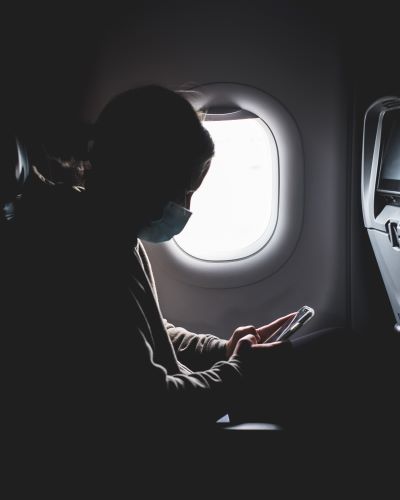The Emotional Tax of Dropping Mask Mandates for Travel
I’ve studied emotion management in air travel and TSA airport security for 12 years. My first scholarly publication likens the emotions in airports to weather patterns. I can imagine how emotionally turbulent travel is feeling right now, now that airlines have completely abandoned any pretense of public safety during an ongoing global pandemic.

As I describe in my book 101 Pat-Downs: An Undercover Look at Airport Security and the TSA, passengers, TSA officers, and flight crew do difficult emotion work during compulsory travel interactions. Those interactions were already stressful pre-pandemic and have gotten more fraught in light of COVID health precautions that not everyone agrees with.
By now suddenly dropping the mask mandates for public transit—really the only health and safety measure left since vaccine requirements never kicked in and social distancing has gone by the wayside—I expect interpersonal tensions to shift more from between passengers-and-employees to passengers-and-passengers.
As I describe in an essay about passenger emotions in airports, passengers are already inclined to view other travelers competitively and express negative emotions as a result. If certain folks take this opportunity to gloat and hassle those of us who continue to wear masks during travel for public and personal safety, I can only imagine the competitiveness and negativity will increase. And not to mention, the utter fear and anxiety of having to travel in an already unsafe environment with people who don’t take public health seriously… no thank you.
As an emotions scholar and someone whose flown three times in two months (more than I’ve flown in the last two years combined), I understand the employee standpoint of relief, especially flight crew. While my work focuses primarily on airport security interactions, it builds upon the original emotional labor research by Dr. Arlie Hochschild which analyzed, in part, the emotion work of flight attendants. The business of policing mask compliance became an added and I’m guessing uncompensated part of their work that increased conflict significantly. I know on my last flight, the lead flight attendant sounded ready to cut someone as she repeated the directives for proper mask wearing three times before we’d even left the ground.
And yet, I’m dismayed at the organizational responses—dropping the mask mandate while also twisting the rationale (looking at you Delta, with your “the pandemic is now an ordinary seasonal virus” nonsense)—which leave employees and passengers unsupported. Especially the most vulnerable among us.
Whatever spirit of “in this together” that started at the beginning of the pandemic has been utterly crushed as governments, organizations and communities abandon public health for the sake of convenience and profit. The pandemic is not over. Masks help slow the spread of disease, especially in close quarters like airplanes. To forego mask requirements when so many (including millions of young children) are not able to be vaccinated is unconscionable.
Ultimately this emotions scholar is depressed at the lack of compassion and concern. It will be a long while before I fly again commercially.